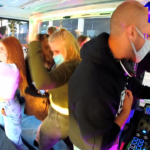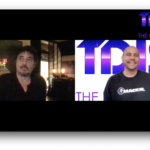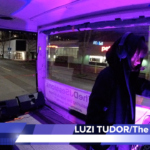The man who introduced The Beatles to Brian Epstein: EXCLUSIVE interview with legendary 1960s Mersey Beat founder Bill Harry

Bill Harry presenting the Beatles with their first-ever award, the Mersey Beat Shield, 1963 © to the owners
Bill Harry is the man who introduced The Beatles to their famous manager Brian Epstein by making the arrangements for him to see them play at The Cavern in Liverpool in November 1961. He is the man who created and managed the legendary local weekly music publication Mersey Beat running from 1961 to 1964 that documented the golden age of Liverpool music and is best known for being the first periodical to feature The Beatles and other Liverpudlian bands of the time, including Gerry and the Pacemakers and The Merseybeats, whose singers Tony Young and Tony Crane we also interviewed.
Mersey Beat newspaper cover with The Beatles, 20th September 1962
Bill Harry is also the man who went to school with John Lennon and Stuart Sutcliffe at the Liverpool College of Art; as you may or may not remember, poor Stuart was the original bass guitarist of The Beatles and a talented painter that tragically died in Hamburg in 1962, aged 21.
Before The Beatles even existed, Bill Harry, John Lennon, Stuart Sutcliffe and Rod Murray formed The Dissenters, and they made a vow to “make Liverpool famous” with their music, their art and their writing. And that’s exactly what they did, so much that Bob Dylan asked specifically for Bill to show him around Liverpool when he went playing there in 1966.
Bill Harry is the true Fab Four’s gatekeeper, a living legend that wrote over 25 books about The Beatles, and also a very kind, charming and unpretentious man.
Bill Harry in 1962 © to the owners
After the project to create a national music paper with Brian Epstein in 1964 failed, Bill moved to London and started doing PR for artists like Led Zeppelin, Pink Floyd, David Bowie, The Beach Boys, Suzi Quatro whom we also interviewed, and many others. To date, he is still putting together memories and stories about his famous mates for new books to come out soon.
Let’s just face it: if you, I and other billions of people worldwide got to know The Beatles, it is primarily thanks to Bill Harry – and no, don’t say that success would have happened in any case, because, in 1962, The Beatles were famously turned away by Decca Records which picked The Tremeloes instead (read our interview with Len Chip Hawkes of The Tremeloes if you’re curious to hear what he has to say about it…)
And so, well, what can I say about it all?
Had you told me at any point in my life that I was going to have the massive honour to run an interview with the leading authority on The Beatles for such a long while that I’d need to break down the text into 8 separate parts, I would have called you crazy: I was born 1391 miles away from Liverpool and I learned the Beatles’ songs by heart through a cassette Walkman on my way to school in 1999 when I didn’t even speak a word of English.
But you know what John Lennon once said?
Life is what happens to you while you’re busy making other plans.
The Beatles arriving at John F. Kennedy International Airport on 7th February 1964 © The United States Library of Congress’ Prints and Photographs division
★ Part 1: Bill Harry on the current state of music, politics, the media, cancel culture and how the press is treating Led Zeppelin
Bill, what do you think of the current state of music?
Mersey Beat newspaper cover with Paul McCartney, 6th August 1964
Well, it’s a lot different from what it was like back in the days and it makes me a bit sad to see once again yesterday, another television talent competition with big money, so what will happen is the same that has been happening for the last 20 odd years, which I think has ruined the music industry in Britain. You have these manufactured people taking part in these standard talent competitions with celebrity judges that are not necessarily even musicians. And when they pick a winner at the end of the whole television series with it being on television, that makes people famous almost immediately, and whoever wins it, they have choreographers, songwriters, a whole team, an expensive team of people that put everything behind them. But when we were doing it and we had artists as Elton John, Rod Stewart, The Beatles, The Rolling Stones, Pink Floyd… you name it, they were actually the people, the musicians, the artists and singers, who did what we call going on the road, building up the audience, developing their skills in front of live audiences all over the place. And that usually took about two years, and when I was working in PR, representing groups like Mott the Hoople, Chicken Shack, Hot Chocolate, I’d go around with them as they built themselves up over all these gigs and everything. That doesn’t happen now: they’re manufactured, it’s a manufactured pop scene where you get these television people and, of course, they’re the ones that get all the publicity now in the newspapers, all the established ones, and it is getting back to that old scene where all the control is in London, and the television controls everything, the media controls everything. And they’re only interested now in the people who are successful, while many other real artists are plugging away in the clubs and building up their talents. The scene is different these days, the real artists are still there, but they don’t get the opportunity to really develop as they could do.
You mentioned the media a lot. What do you think of it?
Oh, the media now is political, even when it gets down to pop music; even under music there’s a political bias to it, and the people writing about music look for the worst thing. For instance, there was a double-page spread about Led Zeppelin in the newspaper yesterday, making out that they’re virtually paedophiles or something, telling how they used to go out with 13 or 14-year-old girls.
Bah.
Now, I represented Led Zeppelin for a couple of years, I know they went after girls, but we’ve never known of them with any young girls whatsoever. You know, with Led Zeppelin I was with them at the gigs, and the music was absolutely fantastic, and audiences loved them and the drummer John Bonham, it was a brilliant group and one of the world’s top groups – and all the media write about now is this, they’re looking for dirty things about them, for bad stories. The other story I’ve read about Jimmy Page of Led Zeppelin recently is the trouble he has in his house about somebody who built in the cellar to his home next door making all the noise.
Sounds like a piece of news that can really make your day.
Yeah, you know, they’re not stories about the music musicians do and their struggle to become more known and things like that; it’s all about picking out the negative side – and I suppose, generally, that the media is a negative media. They believe that bad news sells newspapers, and celebrities really get the people to investigate the bad things about them, not about the music or the films or television things they’re doing, or how good they are or what their acting is like or what the music is like. They want flushed stories, and that’s what the media is like today.
This is a very accurate description. Thank you.
And so with the internet and the people and the music papers out there what happens now to publications like yours is that your publication is the equivalent to what I was doing in Mersey Beat at the beginning of the 1960s because it is the one that is interested in the real stories and the real news and the real talents, unlike the normal press, the established press now.
On, thank you. This is enormously flattering to hear ❤ If John Lennon was here today, what would he have thought of the state of things?
Mersey Beat newspaper cover with John Lennon, 30th July 1964
What John was seeking his whole life was the meaning of life, and part of the meaning of life is a type of freedom that makes life more exciting, and you become less vulnerable if you have faith and belief in things and you’ve got a positive attitude, which is something, I suppose, that doesn’t happen now; everyone’s afraid of everything because our society is going like that. The universities and colleges are warning students about great literature, from Shakespeare onward, the warnings are like “You may get worried, we must tell you that there are some murders in there, which may upset you” – they are afraid that students will be afraid of reading books, they warn them about stories by Robert Louis Stevenson and things. This is something going on not only in politics, but all the media is negative. My wife’s disabled so she takes a bit of relaxation watching television and things, but myself, personally, I’d make a news blackout, I wouldn’t want to look at the news. You know, because it is not necessarily true what happens, and it’s easy to manipulate something and to put down something in a newspaper whether some of the facts may be right, but the way they are put down gave an opposite effect of what they really are. In other words, they can easily manipulate the truth. And this seems to be happening not only in newspapers, but on television, and documentaries, and all the rest of that, because what they’re seeking is sensationalism. Sensationalism can damage a lot of people because it gets twisted, and I see in my researches that the way people put things down gives a different impression.
Musicians seem to fit perfectly in this political agenda, though: no protestations, no criticism, no controversial songs.
Mersey Beat newspaper cover with George Harrison, 1st August 1964
Yeah, because even with musicians, we’re living in a society with what they now call cancel culture. So, comedians are inhibited about what they cannot joke about, and it’s the same with musicians: if you write certain types of songs, that can blow your career. If you say something, you get the trolls on the internet. Let’s say a musician come out with a song which people would say criticises something: they will have trolls, they could have thousands of people on the internet saying “Don’t buy their record” and blah, blah, blah. It once happened with The Beatles when John made those remarks about Christianity, in 1966 in America, and he said that The Beatles were more popular than Jesus: people started burning all the records in the Bible Belt, and the Klu Klux Klan picketed concerts. That put an end to The Beatles’ touring, basically. And that was in the 1960s. This sort of thing would happen more these days. People are afraid to talk. They are afraid to give an opinion. They’re afraid to stand up to themselves, which is sad.
★ Part 2: Bill Harry on childhood, school and career
What was life like when you were a kid?
Bill Harry in 1962 © to the owners
I was born in the sort of dark road area of Liverpool, which is all sort of old and broken sights. I never knew my father because he had been killed in the war when I was two. My grandfather was dying, and my mother was out working all the time. So, basically, I had a solitary existence. We lived in this house which has fallen apart. In fact, the Council eventually moved us out after years and years, we’d said to them that the house has fallen down for so long, and they’d taken no notice. Then, one day that I was staying away for college, when I came home, the street was blocked off, because my bedroom had fallen into the streets. If somebody was walking past, they would have been killed.
Oh my God.
And of course, I was at a dockside school, which was a very rough place. They didn’t care about education. It was all about surviving the big gangs on the corner searching to see if you had any money on you and things like that. And you had to fight all the time. Now, one guy offered to challenge me to a fight so we started up a fight and there was a gang around us. When I knocked him to the ground, I didn’t know it, but his three elder brothers were there so they started kicking my guts in. A lady neighbour sort of pulled them off and took me home, but I was in such agony that they took me to a hospital where they kicked in my appendix and operated straight away – otherwise, I would have died that night. So, my mother used everything she had to pay for me to go to Skerry’s College, and from there I won a scholarship to go to the Junior Art College, and from then on to the Major Art College.
How did you become involved in music?
Well, what happened basically is that when I told you that I sort of lived alone, it has a bit of the thing that I started writing about myself that says that music has been my life, and words seemed inadequate to describe the intense beauty, delight and inspiration it has brought to me over the long years of a lifetime, when I lived in poverty as a child, without even two pennies to rub together between the harshness of the bombed-out streets and the lack of anything substantial, the one thing that stood out and made everything else seem insignificant was music and art.
This is moving.
Bill Harry and his future wife Virginia, Liverpool, 1960s © to the owners
And I actually believe music could touch the soul. As I said, I never knew my father, he was shipped to the war and died when I was two, my grandfather was dying and my mother worked all hours and I hardly saw her. So from an early age, it was a solitary existence, pure by books and music. My mother sent me to Stanhope Street, where a woman tried to teach me to play the piano, I loved the instrument but couldn’t play it. Somehow, I was sent an acoustic guitar, but couldn’t do anything with it, so I swapped it for a cornet and then a piano accordion, but I just couldn’t play any instruments, even when my mother paid a man to teach me harmonica. I had a hand-round gramophone player because you could get one from a secondhand shop, and I would let the sound envelop me on the crackling radio and try to capture Frank Sinatra or Mario Lanza. I listened to the song from My Fair Lady on Sunday evening, my mother sent me to a friend’s house to listen to the top 20 on Radio Luxembourg and, in some ways, poverty seems to vanish from the mind if you are listening to music.
Did you ever try to become a singer?
I did believe I could sing and my friend Will Armstrong would let me sing along with him as he rehearsed his double bass in a room of the local Co-Op. He even took me to listen to music at the Palm Grove, near the top of Smithdown Road where he played. But even with singing, there was a problem: in later years, I teamed up with Jim MacDonald, Ben Folds and Pete “The Beat” McGraw to sing in a synagogue but I forgot the words once I was on stage. That was my problem and why I never sang: I found it difficult to remember the words of songs. So here I was: I couldn’t play an instrument, I couldn’t remember the words of songs, yet the music was to wrap itself around me and dominate my life for the next 60 odd years. It was as if fate aimed me in a specific direction to document and report and outline my feelings about music.
Why didn’t you get into music journalism, then?
Mersey Beat newspaper cover with The Beatles, 19th December 1963
I never wanted to become a critical reviewer: there is so much music out there that it seemed a touch of arrogance to assume that I could take the creative artists’ work apart as a non-musician like so many reporters in the national press did. If you consider someone who made an uninspiring work, you could just ignore it, and there were so many good works to talk about. I took the point of view that music is to be listened to and you can’t actually describe it as such in words: you feel it. However, you could try and capture the world of the musician and composer, what they felt, what inspired them, what their lives were like. So I spent my life writing about music and trying to document specific areas of music or history I have actually experienced and lived through, particularly aiming at the truth, having discovered early on that musical myths are created..



















Comments
This post currently has no comments.